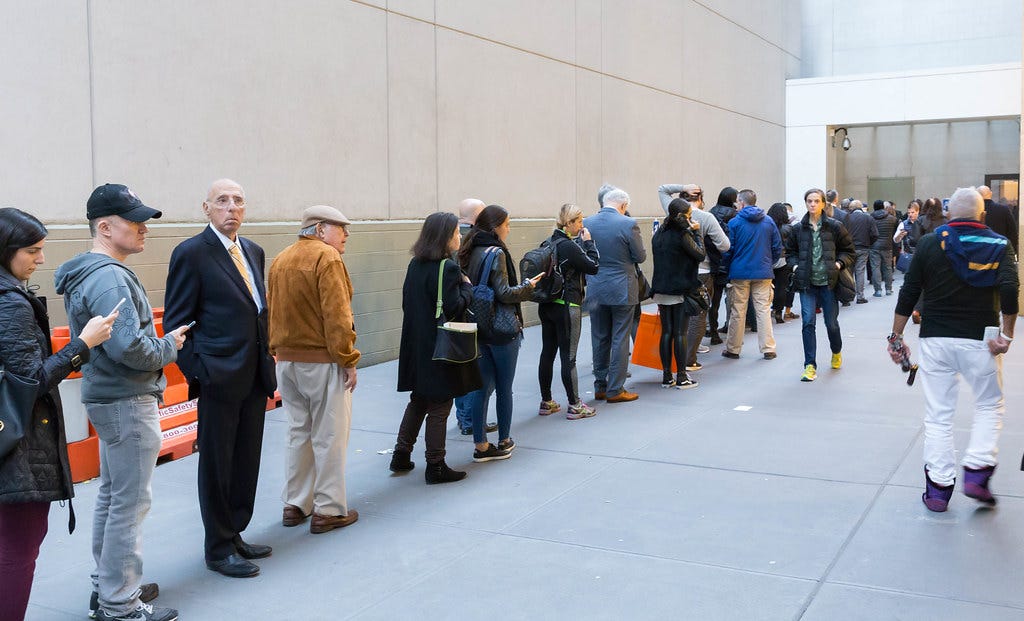One interpretation of "The Way"
There should be no barriers to entry when it comes to helping make Oregon a better state to call home.
Housekeeping
Are we missing a voice on The Oregon Way? Send your tips for potential contributors to kfraz@berkeley.edu
Tell us what we’re getting right and where we can improve. Leave a comment below.
Kevin Frazier is stuck in California waiting to graduate from law school before he returns to Oregon. He’s the “editor” of The Oregon Way, but regards it as a community effort.

Back in 2019, I tried to get involved in the California Democratic Party. My hope was to earn a spot as one of a dozen or so delegates from my area to the Party’s statewide convention. In that capacity, I’d have the chance to vote on platform planks and endorse candidates.
At that point I had lived in the Bay Area for about two years and had come to understand its people, its promise, and its problems—I had seen more deplorable conditions on San Francisco’s streets than I had ever witnessed; I had talked with other Millennials who had given up on the City’s messy and maze-like politics; and, I had tried my best to get involved in the community by writing a column for a local paper and volunteering to help community members get back on their feet after minor legal offenses.
After chats with friends, family, and a few politicos I knew in the City (aka San Francisco), I thought I had a strong case for why I’d be a good representative for the Party.
Boy was I wrong.
My story didn’t matter. My passion didn’t matter. My integrity didn’t matter. What mattered was whether or not I had been sufficiently loyal to a few Party insiders. What mattered was whether I had waited my turn. What mattered was whether I had walked the Party line.
When I showed up to the polling place, it became abundantly obvious that the process was rigged for an open and shut election. Those who had pledged their fealty to the bosses in control of the process were already distributing “slate cards”—these cards had the names of the candidates approved by the Party insiders. Voters simply walked up, grabbed a card, and filled out their ballots without asking any questions.
It’s true that all the candidates, myself included, had an opportunity to speak to potential voters—but the crowd was not inclined to listen. They had received their marching orders and my appeal was simply background noise.

If I sound like a sore loser, it’s because I was one. For years, I had believed that all parties were net positives for our political process. Back in Oregon, I started the statewide College Democrats of Oregon and served as President of that organization; I had also worked for several elected officials.
From those positions, I came to feel like one of the popular kids in high school—I was one of the insiders, one of the folks for whom the cards were stacked and the process made easy. I had never considered the plight of those who had tried to get involved but been pushed out or aside because of their “newness” — be it new ideas, new perspectives, or new backgrounds.
I was a sore loser after my loss in California because I finally knew what it felt like to be an outsider. I saw that the California Democratic Party was focused on power, not people nor policy, and certainly not integrity. Other folks have had different experiences with the Party, but I’ve heard from many others who felt anything but empowered after attempting to make a difference through the organization.
It was never in the interest of the Party officials in California to have someone like me—independently minded and interested in lowering barriers—enter into a formal position of leadership, no matter how small that role may have been. But, because the Party controlled the process, it was also never a possibility that I’d end up in that position.
What does this have to do with Oregon?
To me, one modern interpretation of the “Oregon Way” is about building a community of people that share a deep love for Oregon and an even deeper desire to make it a state where opportunity abounds, regardless of party affiliation, zip code, or background.
It’s a community that wants good ideas to win out over exclusive processes. It’s a community that refuses to accept that the way things are is the way things should be. It’s a community that listens to every participant and never assumes that how someone identifies should ever discredit their passions or ideas.
Parties that lower barriers to participation and foster inclusive environments can be a part of that community. Community associations that do the same can be and are a part of that community as well—same goes for religious organizations.
While all those groups can form a broader and collaborative politcal community, they should never be regarded as gatekeepers. Participation should never be contingent on getting a permission slip from an exclusive organization. Instead, the “default setting” of our democracy and in our community should be full participation.
My hope is that some aspects of this “Way” and community are appealing to you, and that you share my desire to help more Oregonians get involved, speak up, and feel empowered. There should be no barriers to entry when it comes to helping make Oregon a better state to call home. I believe we can make that hope a reality and resolve to do so in 2021.
*****************************************
Send feedback to Kevin:
@kevintfrazier
Keep the conversation going:
Facebook (facebook.com/oregonway)
Twitter (@the_oregon_way)
Check out our podcast:

